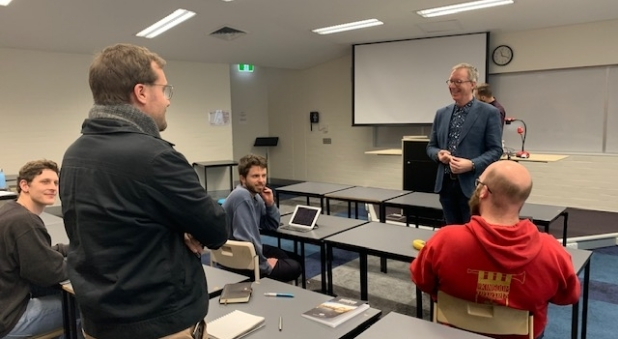The most recent changes to the tertiary education sector are no cause for alarm according to the Rev Dr David Hohne, academic dean of Moore College.
In June the Federal Government announced there would be a rise in the cost to students for a number of popular university courses, such as those in humanities, law, management, communications and social sciences. Together with the 2019 introduction of a loan cap for combined HECS and FEE HELP debt, those thinking of further tertiary education may need to take their student loan amounts into consideration.
However, despite a reshuffling of fees for degrees, this does not mean theological education is out of reach for people.
“We’re not worried about changes to the loan system. Our trust is in the Lord,” Dr Hohne says. “We have to live with those changes all the time. What a student chooses to study will have a flow-on effect to what fee help they can access [at college].”
Many of Moore College’s current students come from a variety of financial contexts and rely on a combination of FEE HELP loans and other financial options.
“Depending on the circumstances of the individual, and the first degree they have chosen, there has always been a balancing act between the debt they have and the FEE HELP they want,” Dr Hohne says.
Often students will rely on other sources of income to help cover costs. Some have spouses who work, some make use of savings, some work part time or secure paid student ministry positions, and others fundraise for their theological education. Moore College also provides systems to help raise funds. The college believes fundraising is a valuable skill for future ministry.
In addition to this, Moore College offers a number of scholarships, allocated on a combination of merit and need. Moore has also a Student Support Fund that allows people to donate independently to a tax deductible fund that supports its students based on identified needs. College supporters understand how costly theological study can be, and want to contribute to the cost of students’ education.
“All ministry will be a matter of having prayer and financial supporters,” Dr Hohne says. “It’s always good for people who are involved in ministry to be skilled at raising support for their ministry. A lot of our students come with this mindset. They’ve been formed towards seeing ministry in that way.
“That’s one of the main differences between being a student at Moore and being a university student. Entering into Moore College is about being formed to be a particular kind of person – one with convictions, character and competency for ministry. College is about who you are, university is about what you can do. Those are two very different ways of understanding your place in the world.”
The extra costs of studying
Course fees comprise only a small portion of what it costs to provide theological education. Along with a grant from the Sydney Diocese, the college raises its own funds to subsidise theological education for students. At the time of writing this article, Moore College aims to keep costs steady, only rising with CPI, and is not planning to pass on any increased degree costs to its students.
Aside from tuition fees, those considering college also need to factor in costs for a residence, books, IT resources, travel costs and daily expenses.
“It is very rare that a student has to discontinue their study for financial reasons, because the Lord provides,” Dr Hohne says. “It happens in a number of ways. The most mundane is that the college has some bursary funds that students can apply for if they are in trouble. Broader than that, [for] students who have established a support network, their supporters help out. In rare but joyful situations, people find sizable cheques in their pigeon holes, or funds anonymously transferred into their accounts when the Lord wants to remain anonymous.
“Preparing to serve the Lord and his people is the sharp end of taking up your cross and following the Lord Jesus,” he adds. “That’s the kind of framework in which I encourage people to think about the life change they are making. Pursuing ministry is not a career, it’s a choice not to have a career. People need to be willing to make that kind of choice.”






















